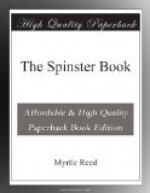[Sidenote: Sins of Commission]
Doing the things which ought not to be done never loses fascination and charm. The rare pleasure thus obtained far exceeds the enjoyment of leaving undone things which ought to be done. Sins of commission are far more productive of happiness than the sins of omission.
[Sidenote: For Posterity]
Thus people whose sense of honour would not permit them to read an open letter which belonged to someone else will go by thousands to purchase the published letters of some famous man. Dr. Arbuthnot, in speaking of the publication of letters, said that it added a new terror to death, so true it is that while a man may think for the present, he unavoidably writes for posterity.
No passion is too sacred to be hidden from the eagle eye of the public. The death of anyone of more than passing fame is followed by a volume of “letters.” It is pathetic to read these posthumous pages, which should have been buried with the hands that wrote them, or consigned to the never-failing mercy of the flames.
Burial has not always sufficed. The manuscript of one well-known book of poems was buried with the lady to whom they were written, but in later years her resting-place was disturbed, with the consent of her lover, for this very manuscript.
Her golden hair had grown after her death, and was found closely entwined with the written pages—so closely that it had to be cut. The loving embrace which Death would not break was rudely forced to yield. Even in her “narrow house” she might not keep her love letters in peace, since the public wanted to read what had been written for her alone and the publisher was waiting for “copy.”
[Sidenote: Letters in a Grave]
In a paper of the Tatler, written by Addison or Steele, or possibly by both, is described a party in a country village which is suddenly broken into confusion by the entrance of the sexton of their parish church, fresh from the digging of a grave. The sexton tells the merrymakers how a chance blow of his pickaxe has opened a decayed coffin, in which are discovered several papers.
These are found to be the love letters received by the wife of Sir Thomas Chichley, one of the admirals of King William. Most of the letters were ruined by damp and mould, but “here and there,” says the Tatler, “a few words such as ‘my soul,’ ‘dearest,’ ‘roses,’ and ’my angel,’ still remained legible, resisting the corrupting influence of Time.”
One of these letters in a grave, which Lady Chichley had requested might be buried with her in her coffin, was found entire, though discoloured by the lapse of twenty years. Its words were these:
“Madam:
“If you would know the greatness of my love, consider that of your own beauty. That blooming countenance, that snowy bosom, that graceful person, return every moment to my imagination; the brightness of your eyes hindered me from closing mine since I last saw you. You may still add to your beauties by a smile. A frown will make me the most wretched of men, as I am the most passionate of lovers.”




